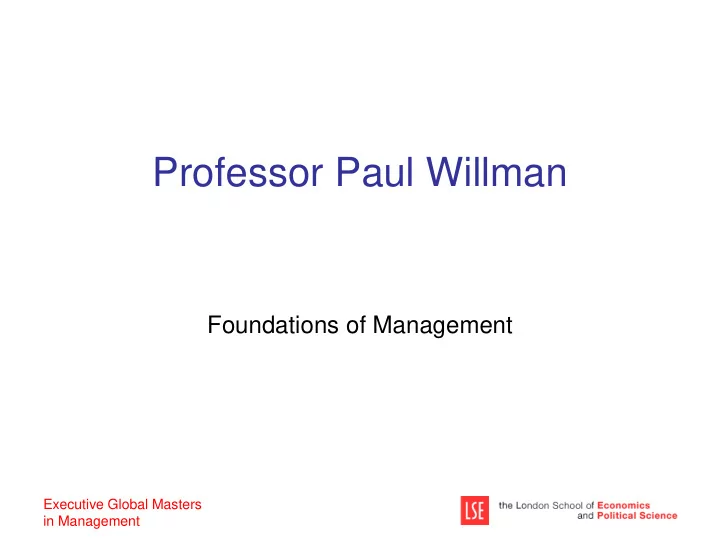

Professor Paul Willman Foundations of Management Executive Global Masters in Management
What are we here to study? – the background • Following the industrial revolution in the west (or as part of it) there was a growth in large firms. • Much economic activity took place within such firms, which developed elaborate, mostly hierarchical structures, borrowing from the experience of large state or religious organisations • These firms became powerful economic and political actors within western nations, often acting to transform the societies in which they operated. • Theorists sought to address, both descriptively and prescriptively, how such large organisations operated. In the late 19 th and early 20 th century, business or management theory emerged. • It borrowed heavily from existing social science, but in turn came to influence it. • The borrowing was often concerned to develop technique – practical applications of social science in order to run businesses or develop markets. Executive Global Masters in Management
CORE DISCIPLINES • ECONOMICS – Finance, Strategy, Marketing • MATHEMATICS – Finance, Decision Sciences • PSYCHOLOGY – Organisational Behaviour, Marketing, Strategy, Behavioural Finance • SOCIOLOGY – Strategy, Organisational Behaviour, Accounting & Marketing Executive Global Masters in Management
What are we here to study? – some questions • How much of the theory applied to business in this process is time bound – late C19 – C20? • How much of it is specifically western? • How much of it ever worked? • To what extent did it explain business practice or shape it? • Which elements are resilient? • How can we learn to use them? Executive Global Masters in Management
A 20 th Century Business School…why did this happen? Accounting Finance Operations Organisational Marketing Strategy Decision Behaviour/Theory Sciences MBA Executive Education Executive Global Masters in Management
CORE CONCEPTS • Market, hierarchy and network • Co-ordination and control • Contract • Individual and Collective action • Rationality and Irrationality • Incentive and Performance • Efficiency and Cost • Price and Profit • Agency • Competitive advantage Executive Global Masters in Management
Characteristics of this Knowledge Set • Opportunistic – borrowing of ideas to solve perceived business problem. E.g. studies of soldier stress to devise working times. • Eclectic – ideas from anywhere. E.g. culture from anthropology, competitive advantage from economics, portfolio theory from maths. • Fragmented (and sometimes internally inconsistent). E.g. optimising individual productivity through engagement or throughput. • Derivative – second mover advantage. E.g. options pricing using heat diffusion equaltions. Executive Global Masters in Management
The Big Picture During the ‘short’ C20th, 1914 -90, the study of management grew.. • From applied engineering to a 6- ’discipline’ curriculum • From vocational education to a multi-billion $ business • From a ‘technical’ best practice approach to a moral and ethical crisis Executive Global Masters in Management
The Short C20th • War • Collapse of C19th globalisation • More War • The American Dream • Cold War • Competition from the East • Triumph of capitalism? Executive Global Masters in Management
Short C20th - Issues • The control of labour • The rise of the large firm and the development of mass markets • Managerial Capitalism • Japanese competition • Unleashing financial markets Executive Global Masters in Management
Control in Hierarchies and Markets Industrial Relations Human Resource Management Labour Market Manufacturing conception Marketing The Firm Product market Marketing conception Organisational Design Management Accounting Strategy Operations management Financial Accounting Capital Market Finance Finance conception Executive Global Masters in Management
The early 21 st century • Dot.com boom • Dot.com crash • Brics • ‘Hollowing out’ of American manufacturing • Another crash (too many crashes for a normal distribution) • Hungry governments Executive Global Masters in Management
Issues • End of the public company? (Jensen) • End of investment banking? (Disintermediation of financial markets) • Partnerships are back (PE, Hedge funds). • From vertical integration to the global supply chain (Nike, Apple). • Shrinking banks (Non-bank lending). • Growth in intra-firm inequality • Return of ‘big government’?
Studying Management • The six discipline set is no longer enough. • Politics, Law, Sociology, Macro-economics • Imperialism of financial economics over? (efficient markets and strategy- Shiller and Jensen) • Firm as the unit of analysis? • Rationality as a variable. Executive Global Masters in Management
Thinking About Management Management Process Irrational Rational Organisational and financial Managerial decision making, Make a economics , e.g. Jensen, e.g. Simon, Kahneman difference game theorists Chroniclers Theologians Management Tools Process and tool builders, Management as ritual, e.g. ‘anthropologists, e.g. Taylor, Kaplan, Hamel Make no difference Sceptics Preachers Executive Global Masters in Management
Recommend
More recommend